election
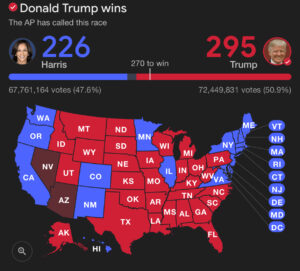 Yesterday, Americans went to the polls to elect our next president. We do this every four years, and whether your candidate wins or loses, it is a right that belongs to every US citizen over the age of 18 years. It isn’t a right that should be taken lightly. There are nations who do not have this right…and unfortunately, there are people who don’t vote and therefore forfeit their right. I understand that many people thing that their vote doesn’t matter, but every vote matters…every vote counts. I don’t care if you live in a state that is so completely red or so completely blue that you don’t think that your vote could possibly make a difference, it can. Change often happens slowly, but when enough people see a need for change, and they vote, change eventually happens. Take for example the states that flipped from Democrat to Republican in this election. People wanted change, and they went out to vote so they could get it.
Yesterday, Americans went to the polls to elect our next president. We do this every four years, and whether your candidate wins or loses, it is a right that belongs to every US citizen over the age of 18 years. It isn’t a right that should be taken lightly. There are nations who do not have this right…and unfortunately, there are people who don’t vote and therefore forfeit their right. I understand that many people thing that their vote doesn’t matter, but every vote matters…every vote counts. I don’t care if you live in a state that is so completely red or so completely blue that you don’t think that your vote could possibly make a difference, it can. Change often happens slowly, but when enough people see a need for change, and they vote, change eventually happens. Take for example the states that flipped from Democrat to Republican in this election. People wanted change, and they went out to vote so they could get it.
Of course, sometimes things have to get so bad that if makes people go out to vote. That can be the hardest part, because things do have to get pretty bad. Nevertheless, the people living in this era were born “for such a time as this.” We may not know it, but it is the truth. Each of us has face the times we are in, and we have decided whether we like what is going on or not. Then we act…but only if we get out and vote. Being angry, frustrated, or just done with it, will not create change. Only voting can do that…well, voting and much prayer. I’m sure you can tell which side of the coin I fall on, and that’s ok. I may be for one side or the other, but I firmly believe that people from both sides have a say, and a right to choose. 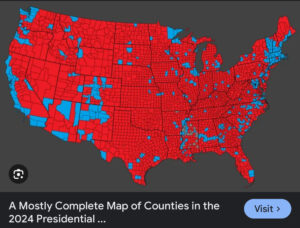
Of course, along with the right to vote, comes the right not to vote, and that too, is your right, but in my opinion, that is not the best way to go. My candidate may or may not win, as president, or any other office, but by voting, I have had my say in the matter. Sometimes, a win that is completely unexpected happens, because the voters turn out. You have tremendous power. That vote carries weight. It says, “I am making a stand!! This is how I see things…like it or not!! It’s my vote…and mine alone!! No one can make me vote one way or the other…or at all, but if I don’t vote, my voice is silenced.”
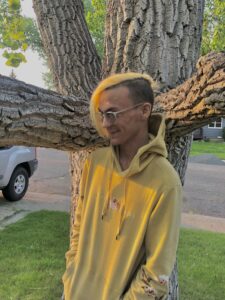
 When a boy becomes a man, it’s hard not to reflect on the boy he was, and what things brought him to the kind of man he has now become. For my grandnephew, Matthew “Matt” Masterson, that means thinking about the fact that he was the only son of my nephew, Rob Masterson and his wife, Dustie Masterson. Matt had three sisters, Christina Masterson (who lives in Colorado), Raelynn Masterson, and Taylor Masterson. Growing up with three sisters, Matt often found himself needing to be a man among his siblings, even though he was still a boy. Nevertheless, Matt stepped up to the plate.
When a boy becomes a man, it’s hard not to reflect on the boy he was, and what things brought him to the kind of man he has now become. For my grandnephew, Matthew “Matt” Masterson, that means thinking about the fact that he was the only son of my nephew, Rob Masterson and his wife, Dustie Masterson. Matt had three sisters, Christina Masterson (who lives in Colorado), Raelynn Masterson, and Taylor Masterson. Growing up with three sisters, Matt often found himself needing to be a man among his siblings, even though he was still a boy. Nevertheless, Matt stepped up to the plate.
Christina wasn’t with Matt as much as the other girls, so he didn’t have to protect her so much. Nevertheless, they were sibling friends, and they love each other very much. Raelynn probably needed her brother the most. She is just a little over two years older than Matt, but when it came to the things she “just couldn’t deal with,” Matt stepped up…literally. Raelynn was afraid of ants…to the point that she didn’t want to share the same sidewalk with them. I get it. Bugs in general just have no business being alive, and yes, I know that they each have their purpose, but not in my world. Matt, being the brave boy he 
 was, would walk in front of his sweet sister, and kill the ants, so the sidewalk was clear for he to walk. His sister, Taylor has a tender head, and her mom, Dustie, in a hurry to get three kids ready for school and such, just wasn’t gentle enough for Taylor. Enter Matt, he was very careful not to pull his sister’s hair, but he was still able to get it brushed and get her ready for school.
was, would walk in front of his sweet sister, and kill the ants, so the sidewalk was clear for he to walk. His sister, Taylor has a tender head, and her mom, Dustie, in a hurry to get three kids ready for school and such, just wasn’t gentle enough for Taylor. Enter Matt, he was very careful not to pull his sister’s hair, but he was still able to get it brushed and get her ready for school.
Matt is growing in the Lord too, and these days, he and his mom have been having mature conversations about God, politics, and other current events. Matt has a good grasp on what’s going on in the world and like his mom, he researches it from both angles to make a better-informed decision as to which side of the coin he is on. Matt will be voting in his first election this next year, and he is very excited to be able to participate in the election process. Matt has decided that he is a Republican, and that was after much research and making up his own mind. His mom very much encouraged, 
 because she always insisted that they all do their own research and decide for themselves. Matt took that very seriously. While Covid messed with Matt’s high school career, he plans to get his GED and wants to go to college. He hasn’t decided on a course of study yet, but he wants college. He truly is growing into a fine young man, and his parents are very proud of him. Today is Matt’s 18th birthday. Happy birthday Matt!! Have a great day!! We love you!!
because she always insisted that they all do their own research and decide for themselves. Matt took that very seriously. While Covid messed with Matt’s high school career, he plans to get his GED and wants to go to college. He hasn’t decided on a course of study yet, but he wants college. He truly is growing into a fine young man, and his parents are very proud of him. Today is Matt’s 18th birthday. Happy birthday Matt!! Have a great day!! We love you!!
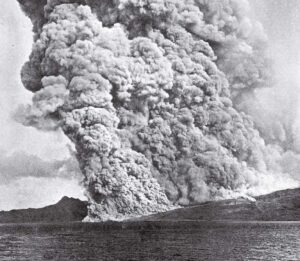 Anytime a volcano erupts, there is going to some degree of destruction, and most of the time, there is little notice. Some eruptions, however, bring more destruction and death that others. The eruption of Mount Pelée on the island of Martinique in the Caribbean on May 8, 1902, resulted in nearly 30,000 deaths and the destruction of the town of Saint Pierre. When the eruption occurred, the pyroclastic flow, also called a pyroclastic cloud, hit the town totally destroying it…or almost all of it. The city was virtually wiped off the map.
Anytime a volcano erupts, there is going to some degree of destruction, and most of the time, there is little notice. Some eruptions, however, bring more destruction and death that others. The eruption of Mount Pelée on the island of Martinique in the Caribbean on May 8, 1902, resulted in nearly 30,000 deaths and the destruction of the town of Saint Pierre. When the eruption occurred, the pyroclastic flow, also called a pyroclastic cloud, hit the town totally destroying it…or almost all of it. The city was virtually wiped off the map.
A prisoner, Ludger Sylbaris, who was born sometime around 1875. Sylbaris who used the aliases Auguste Ciparis, Joseph Surtout, and other names, was a convicted felon who had violated his parole. When he was captured, it was decided that he would be confined to an underground cell in Saint Pierre. As smoke filled the sky and lava made its way toward Saint Pierre, Sylbaris reportedly knew nothing of what was happening around him. Nevertheless, while he was right in the path of the destruction, his underground prison would end up protecting him while the rest of Saint Pierre was destroyed. The search for survivors consumed the rescue workers, and it wasn’t until four days after the city was destroyed that Sylbaris was found, half-conscious and burned.
The eruption of Mount Pelée began, or more correctly, it began to show signs on April 2, 1902. Mount Pelée, 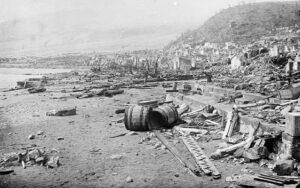 which means bald in French, was a 4,500-foot mountain on the north side of the Caribbean Island of Martinique. On April 2nd, new steam vents were spotted on the peak, which overlooked the port city of Saint Pierre. Three weeks later, tremors were felt on the island and Mount Pelée belched up a cloud of ash. That was all the warning they had, but in 1902, they might not have realized just how grave their situation was. On May 7, activity on the volcano increased dramatically and the blasts grew significantly stronger. Overnight, there were several strong tremors and a cloud of gas with a temperature of more than 3,000 degrees Fahrenheit spilled out of the mountain. Finally, a tremendous blast in the early morning hours of May 8th sent a pyroclastic flow of boiling ash down the side of the mountain. By the time anyone realized they were in serious trouble, it was too late to get away, which is what caused the 30,000 deaths. It also left the prisoner, Sylbaris in an underground cell, with no one knowing that he was there. Only a thorough search of the area and the fact that he had been housed underground, saved his life.
which means bald in French, was a 4,500-foot mountain on the north side of the Caribbean Island of Martinique. On April 2nd, new steam vents were spotted on the peak, which overlooked the port city of Saint Pierre. Three weeks later, tremors were felt on the island and Mount Pelée belched up a cloud of ash. That was all the warning they had, but in 1902, they might not have realized just how grave their situation was. On May 7, activity on the volcano increased dramatically and the blasts grew significantly stronger. Overnight, there were several strong tremors and a cloud of gas with a temperature of more than 3,000 degrees Fahrenheit spilled out of the mountain. Finally, a tremendous blast in the early morning hours of May 8th sent a pyroclastic flow of boiling ash down the side of the mountain. By the time anyone realized they were in serious trouble, it was too late to get away, which is what caused the 30,000 deaths. It also left the prisoner, Sylbaris in an underground cell, with no one knowing that he was there. Only a thorough search of the area and the fact that he had been housed underground, saved his life.
In the end, it was determined that because they were caught up in the midst of an important election, the 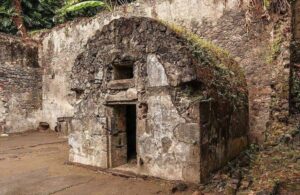 residents of Saint Pierre failed to heed the mountain’s warnings and evacuate. They mistakenly believed that the only danger from the volcano was lava flow and assumed that if lava started to flow, they would have plenty of time to flee to safety. In fact, some people came from outside the city to view the action, even after ash from the eruption began to block roads. The city of Saint Pierre was buried within minutes and virtually everyone died instantly. There were only two reported survivors, one being Sylbaris, the prisoner held in an underground cell. In addition to the destruction of the city, 15 ships in the harbor were capsized by the eruption. One ship managed to stay afloat with half the crew surviving, although most suffered serious burns.
residents of Saint Pierre failed to heed the mountain’s warnings and evacuate. They mistakenly believed that the only danger from the volcano was lava flow and assumed that if lava started to flow, they would have plenty of time to flee to safety. In fact, some people came from outside the city to view the action, even after ash from the eruption began to block roads. The city of Saint Pierre was buried within minutes and virtually everyone died instantly. There were only two reported survivors, one being Sylbaris, the prisoner held in an underground cell. In addition to the destruction of the city, 15 ships in the harbor were capsized by the eruption. One ship managed to stay afloat with half the crew surviving, although most suffered serious burns.
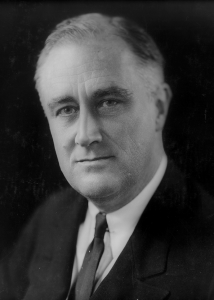 Most people believe that a there was always a two term limit on the office of the President of the United States, but that wasn’t always so. On November 5, 1940 Franklin D Roosevelt broke a long-held precedent, but not a law. The precedent was one that started with George Washington, when he became the first president elected to a third term. Roosevelt would go on to vie for, and win a fourth term, taking office again on January 20, 1945.
Most people believe that a there was always a two term limit on the office of the President of the United States, but that wasn’t always so. On November 5, 1940 Franklin D Roosevelt broke a long-held precedent, but not a law. The precedent was one that started with George Washington, when he became the first president elected to a third term. Roosevelt would go on to vie for, and win a fourth term, taking office again on January 20, 1945.
Roosevelt was the first president to win four terms, and the last president to win more than two consecutive presidential elections. His exclusive four terms were in part a consequence of timing. His election for a third term took place as the United States remained in the throws of the Great Depression and World War II had just begun. FDR (as he was known) was not the first president to try for multiple terms, but the instability of the times allowed him to make a strong case for stability…and how he, alone, could make that happen.
Says Barbara Perry, professor and director of presidential studies at the University of Virginia’s Miller Center, “You have economic-domestic issues and you have foreign policy with the outbreak of World War II in 1939. And then you have his own political viability—he had won the 1936 election with more than two-thirds of the popular vote.” It wasn’t that FDR’s policies were necessarily good for the country, and in fact, it is my opinion that most were disastrous, but since I was not born during FDR’s time in office, I suppose my only proof is history, and there are two sides to every story. All we can do is to look back at just how long it took to pull this nation out of the Great Depression, and draw our own conclusion from there. Anytime economic policies bring about big government, they hurt the American people.
The fact remains that any politician who is in office too long is a danger to this nation. I believe that we need to have term limits in every office there is. When a politician is in office too long, they begin to act like a dictator, and think that they don’t have to answer to anyone. Too much power in any one person’s hands creates greed and evil. Eventually, the United States lawmakers began to argue that term limits were necessary to keep abuse of power in check. FDR passed away on April 12, 1945, less than 3 months into his fourth term. Two years after FDR’s death, Congress passed the 22nd Amendment, limiting presidents to two terms. Then amendment was then ratified in 1951. At the time of FDR’s third presidential run, however, “There was nothing but precedent standing in his way, but, still, precedent, especially as it relates to the presidency, can be pretty powerful,” said Perry. A third consecutive run had been tried by other presidents, but they had failed. People really don’t want that.
The idea of needing term limits was not found among the framers of the Constitution, most of whom did not see the need. I’m sure they never considered man’s ability to be greedy and power-hungry, but Washington saw the importance, thus the precedent in not seeking re-election for a third time. Still, some had tried. 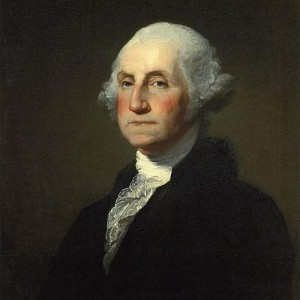 Ulysses S Grant lost a third campaign in 1880, when James Garfield clinched the Republican nomination. Theodore Roosevelt lost his bid at a third nonconsecutive term in 1912 to William Howard Taft (he had previously served out the remainder of President William McKinley’s term and then won reelection). And Woodrow Wilson lost the Democratic nomination in 1920. Harry Truman, who succeeded FDR after his death, was president when the 22nd Amendment passed and so was exempt from the new rule. Truman campaigned for a third term in 1952, but withdrew after losing in the New Hampshire primary. Roosevelt’s campaign for a third term took place as the United States had not yet entered World War II, and the president was still trying to hold the line in an isolationist pattern…another of his disastrous policies. And just one more reason to make term limits in all public offices mandatory.
Ulysses S Grant lost a third campaign in 1880, when James Garfield clinched the Republican nomination. Theodore Roosevelt lost his bid at a third nonconsecutive term in 1912 to William Howard Taft (he had previously served out the remainder of President William McKinley’s term and then won reelection). And Woodrow Wilson lost the Democratic nomination in 1920. Harry Truman, who succeeded FDR after his death, was president when the 22nd Amendment passed and so was exempt from the new rule. Truman campaigned for a third term in 1952, but withdrew after losing in the New Hampshire primary. Roosevelt’s campaign for a third term took place as the United States had not yet entered World War II, and the president was still trying to hold the line in an isolationist pattern…another of his disastrous policies. And just one more reason to make term limits in all public offices mandatory.
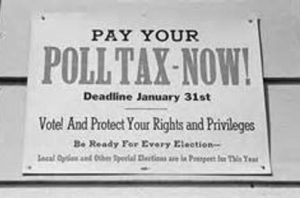 Those of us living today, might not have heard of a thing called a Poll Tax, but it was a very real thing, and with the election process just behind us, I think this might be something worth hearing. The Poll Tax was also known as a head tax or a capitation tax (meaning a tax for a head count). When I first thought about this particular tax, I thought well, maybe that kind of a tax could have ensured a fair election, but really, the opposite is true. While the head tax was considered an important source of revenue for many governments, from ancient times until the 19th century, in the United States at least; voting poll taxes (whose payment was a precondition to voting in an election) have been used to disenfranchise impoverished and minority voters (especially under Reconstruction). I find that absolutely unbelievable. In this nation in most election years, we have to practically beg people to get out and vote. Charging them money for it would all but insure a poor turnout. It would also insure that only those well enough off to be able to “throw money” at an election would be able to vote. Now that is truly appalling.
Those of us living today, might not have heard of a thing called a Poll Tax, but it was a very real thing, and with the election process just behind us, I think this might be something worth hearing. The Poll Tax was also known as a head tax or a capitation tax (meaning a tax for a head count). When I first thought about this particular tax, I thought well, maybe that kind of a tax could have ensured a fair election, but really, the opposite is true. While the head tax was considered an important source of revenue for many governments, from ancient times until the 19th century, in the United States at least; voting poll taxes (whose payment was a precondition to voting in an election) have been used to disenfranchise impoverished and minority voters (especially under Reconstruction). I find that absolutely unbelievable. In this nation in most election years, we have to practically beg people to get out and vote. Charging them money for it would all but insure a poor turnout. It would also insure that only those well enough off to be able to “throw money” at an election would be able to vote. Now that is truly appalling.
It is my understanding that originally the “poll tax” or maybe more correctly, head tax was not about an election, but more like the census. It even has Biblical roots…Mary and Joseph went to Bethlehem to be counted and pay their taxes to Caesar Augustus. This was the first of the head taxes. The tax might have been originally a way to bring in revenue. The poll taxes that followed, in most cases, were purely discriminatory. 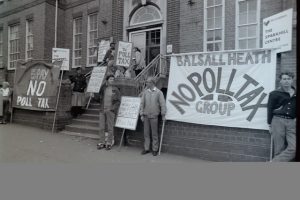 These latter poll taxes ensured that only wealthy people got the chance to cast their vote…thereby putting in candidates that those in charge wanted.
These latter poll taxes ensured that only wealthy people got the chance to cast their vote…thereby putting in candidates that those in charge wanted.
While the Poll Tax might have been a way to bring in money for governments, it seems to me that it could also be a way to make sure that the people vote for the candidate the government wants. Those who might have voted for change to improve the situation in their own neighborhoods, towns, cities, and states, were usually the poorer people, but they couldn’t vote for someone who could help, because they didn’t have the money. Many of these people were minorities. Head taxes were important sources of revenue for many governments from ancient times until the 19th century. In the United Kingdom, poll taxes were levied by the governments of John of Gaunt in the 14th century, Charles II in the 17th and Margaret Thatcher in the 20th century. By their very nature, poll taxes are considered very regressive taxes, are usually very unpopular and have been implicated in many uprisings.
On August 27, 1962, the Twenty-fourth Amendment (Amendment XXIV) of the United States Constitution was proposed. The Twenty-fourth Amendment prohibits both Congress and the states from conditioning the right to vote in federal elections on payment of a poll tax or other types of tax. The amendment was ratified by the states on January 23, 1964. When the 24th Amendment was ratified in 1964, five states still retained a poll tax. Those states were Alabama, Arkansas, Mississippi, Texas, and Virginia. These states continues the practice 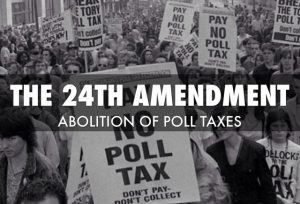 even though the amendment prohibited requiring a poll tax for voters in federal elections. Finally, in 1966 the US Supreme Court ruled 6–3 in Harper v. Virginia Board of Elections, that poll taxes for any level of elections were unconstitutional. The ruling stated that the poll tax violated the Equal Protection Clause of the Fourteenth Amendment. Further litigation related to potential discriminatory effects of voter registration requirements has generally been based on application of this clause. Those of us living today, might not have heard of a thing called a Poll Tax, but it was a very real thing, and with the election process just behind us, I think this might be something worth hearing. The Poll Tax was also known as a head tax or a capitation tax (meaning a tax for a head count).
even though the amendment prohibited requiring a poll tax for voters in federal elections. Finally, in 1966 the US Supreme Court ruled 6–3 in Harper v. Virginia Board of Elections, that poll taxes for any level of elections were unconstitutional. The ruling stated that the poll tax violated the Equal Protection Clause of the Fourteenth Amendment. Further litigation related to potential discriminatory effects of voter registration requirements has generally been based on application of this clause. Those of us living today, might not have heard of a thing called a Poll Tax, but it was a very real thing, and with the election process just behind us, I think this might be something worth hearing. The Poll Tax was also known as a head tax or a capitation tax (meaning a tax for a head count).

 Let’s face it…2020, doesn’t seem to have a lot in it to be thankful for. It has been a tough year in many ways. With Covid-19, quarantines, lock downs, job losses, business losses, election struggles, riots, protests, and homeschooling…by choice or not, things looked pretty grim. Many people have lost loved ones, or friends, or friends and family of friends. Still, we have survived…those of us left, and many of us have contracted Covid-19, and still we have survived. This has been awful, and we will always miss those we have lost, but we Americans are a strong breed. We built this nation on God’s ways, and while some would disagree, that is a fact. Our forefathers came to this country to escape religious persecution, and founded this country on the principle that we should all have freedom to worship as we see fit. They knew that people would disagree on religion, but each person should have the right to choose for themselves.
Let’s face it…2020, doesn’t seem to have a lot in it to be thankful for. It has been a tough year in many ways. With Covid-19, quarantines, lock downs, job losses, business losses, election struggles, riots, protests, and homeschooling…by choice or not, things looked pretty grim. Many people have lost loved ones, or friends, or friends and family of friends. Still, we have survived…those of us left, and many of us have contracted Covid-19, and still we have survived. This has been awful, and we will always miss those we have lost, but we Americans are a strong breed. We built this nation on God’s ways, and while some would disagree, that is a fact. Our forefathers came to this country to escape religious persecution, and founded this country on the principle that we should all have freedom to worship as we see fit. They knew that people would disagree on religion, but each person should have the right to choose for themselves.
This year has tested us in so many ways, but we are Americans, and we don’t give up. We are patriots, and we 
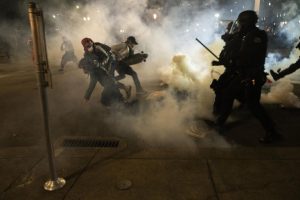 love God and country. As we are faced with new challenges, we have a chance to prove once again that we are fighters. We might be down right now, but we aren’t out, and we don’t quit. America is still the land where dreams come true, and it’s because we never give up. This year has been harder than any in my lifetime…maybe harder than any in the lifetimes of most of us, but we have come through it together. That is something to be thankful for, even with all the worry, loss, and fighting. Thanksgiving is a time to think back on the past year, and on our lives, and to be thankful for all we have been given.
love God and country. As we are faced with new challenges, we have a chance to prove once again that we are fighters. We might be down right now, but we aren’t out, and we don’t quit. America is still the land where dreams come true, and it’s because we never give up. This year has been harder than any in my lifetime…maybe harder than any in the lifetimes of most of us, but we have come through it together. That is something to be thankful for, even with all the worry, loss, and fighting. Thanksgiving is a time to think back on the past year, and on our lives, and to be thankful for all we have been given.
This year may have been a really hard one, but our loved ones who have gone on before us, would never want us to give up…or quit. They would want us to live on and be happy. They would want us to be thankful, and to live our lives in such a way as to make them proud. We could have given up this year, but that was never really 
 an option…now, was it? Thanksgiving is our day to celebrate this land that was founded on our love for God. So whether you are in quarantine, in a city where gathering together is only allowed in small groups, or just far away from your family, remember to take a few minutes to thank God for all we have been given. We are among the most blessed people in the world, and we need to remember that. Happy Thanksgiving everyone!! God bless you all and God bless America!!
an option…now, was it? Thanksgiving is our day to celebrate this land that was founded on our love for God. So whether you are in quarantine, in a city where gathering together is only allowed in small groups, or just far away from your family, remember to take a few minutes to thank God for all we have been given. We are among the most blessed people in the world, and we need to remember that. Happy Thanksgiving everyone!! God bless you all and God bless America!!
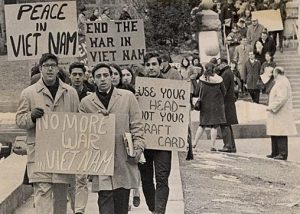 Registering for the draft is a requirement when a young man reaches 18 years of age. There is no draft in the United States anymore, but by registering the young men, the government could hold a draft, should a war bring such a need. During the Vietnam War, there were a lot of people who felt that the United States shouldn’t be in the war. Many young men didn’t want any part of it, and they decided to protest the war by burning their draft cards. Of course, this was forbidden by law, but they didn’t care. They were willing to take the chance, if it meant that they could avoid going to war.
Registering for the draft is a requirement when a young man reaches 18 years of age. There is no draft in the United States anymore, but by registering the young men, the government could hold a draft, should a war bring such a need. During the Vietnam War, there were a lot of people who felt that the United States shouldn’t be in the war. Many young men didn’t want any part of it, and they decided to protest the war by burning their draft cards. Of course, this was forbidden by law, but they didn’t care. They were willing to take the chance, if it meant that they could avoid going to war.
By May 1965 young men were protesting by burning their draft cards with greater frequency around the United States. To limit this kind of protest…in August 1965 the United States Congress enacted a law to broaden draft card violations to punish anyone who “knowingly destroys, knowingly mutilates” his draft card. Then, on October 15, 1965, in New York, David Miller, a young Catholic pacifist, became the first US war protestor to burn his draft card at a protest rally, in direct violation of a recently passed law forbidding such acts. Agents from the Federal Bureau of Investigation later arrested him. He was tried, found guilty, and sentenced to two years imprisonment, but that did not stop the protesting or the burning of draft cards. Subsequently, 46 men were indicted for burning their draft cards at various rallies, and four major court cases were heard. One of them, United States v. O’Brien, was argued before the Supreme Court. The act of draft card burning was defended as a symbolic form of free speech, a constitutional right guaranteed by the First Amendment. The Supreme Court decided against the draft card burners. It determined that the federal law was justified and that it was unrelated to the freedom of speech. This outcome was criticized by legal experts.
From 1965 to 1973, few men in the United States were convicted of burning their draft cards, and some 25,000 went unpunished. I suppose it was difficult to wrap our minds around the idea imprisonment for our young men over a protest. Still, it was illegal. And something had to be done. Before 1965, the act of burning a draft card was already prohibited by US statute and the registrant was required to carry the card at all times. Any destruction of the card was against the law. Also, it was entirely possible for a young man to destroy his draft card and still answer the call to service by appearing at an induction center and serving in the military. It also seems to me that if they had registered, that the government also had a copy of the registration, so if they were going to be drafted, having or not having the card was really a formality. And it was possible for a registrant to faithfully keep his card on his person but fail to appear when called. The draft 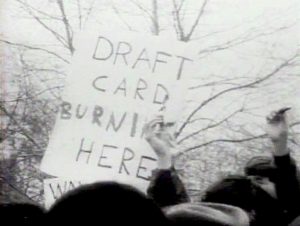 card burning was an act of protest against the war, more than it was a way to avoid the draft. Still, the image of draft card burning was powerful, and very influential in American politics and culture. Photos appeared in magazines, newspapers and on television. It was proof of a political divide between those who backed the United States government and its military goals and those who were against any United States involvement in Vietnam. With the political upheaval, Richard Nixon ran for president in 1968 on a platform based largely on putting an end to the draft, hoping to put an end to protesters burning their cards. As president, Nixon indeed did end the draft in 1973, rendering the symbolic act of draft card burning unnecessary, and registering just a requirement.
card burning was an act of protest against the war, more than it was a way to avoid the draft. Still, the image of draft card burning was powerful, and very influential in American politics and culture. Photos appeared in magazines, newspapers and on television. It was proof of a political divide between those who backed the United States government and its military goals and those who were against any United States involvement in Vietnam. With the political upheaval, Richard Nixon ran for president in 1968 on a platform based largely on putting an end to the draft, hoping to put an end to protesters burning their cards. As president, Nixon indeed did end the draft in 1973, rendering the symbolic act of draft card burning unnecessary, and registering just a requirement.
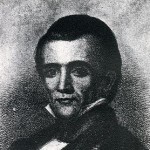 Today is election day, and while I hope everyone will get out there and vote, this is not going to be a political push blog, but rather a way of looking back on our family’s past. Most of us have a politician or two in our history, and probably even a president or two in our past. Our family is no different. I have long been told by Bob’s grandmother that Bob is related to President James K Polk. I wasn’t sure at first how that relationship ran, but then she told me that his middle name was Knox, which was her married name. So in tracing the line, I have found that James K Polk is Bob’s second cousin 5 times removed. It’s funny how close some of those relationships seem.
Today is election day, and while I hope everyone will get out there and vote, this is not going to be a political push blog, but rather a way of looking back on our family’s past. Most of us have a politician or two in our history, and probably even a president or two in our past. Our family is no different. I have long been told by Bob’s grandmother that Bob is related to President James K Polk. I wasn’t sure at first how that relationship ran, but then she told me that his middle name was Knox, which was her married name. So in tracing the line, I have found that James K Polk is Bob’s second cousin 5 times removed. It’s funny how close some of those relationships seem.
The Knox side of Bob’s family is also related to President Andrew Jackson. This relationship is a little more distant, in that it is by marriage. Andrew Jackson is the husband of the aunt of the wife of Bob’s first cousin 6 times removed. Now that one is a mouthful, and if your aren’t too sure just exactly how that whole relationship works, don’t worry, because you are not alone. That one is enough to throw anyone who isn’t able to look at it on a family history timeline.
Through Bob’s family on the Knox side, I have also found that we are shirttail relation to George HW Bush, and of course, George W Bush, but it would take me a while to break down the exact relationship there for you. Suffice it to say, that while I am very happy to be related to them, as most of you would be able to guess, we were, nevertheless, not invited to the White House for Christmas, because I’m quite sure that they have no idea who I am, much less that we are distantly related. That is a fact that I find to be a bit of a bummer, since I would love to spend just one Christmas at the White House. Can you just imagine!!
I’m quite sure there are other presidents, as well as other politicians, in our family tree, but so far I have not located them. What I have realized, however, is that some families tend to have politics running through their veins. That definitely appears to be the case in Bob’s family, or at least the Knox side of it. So, what about you? Do you have a president or two hiding in the woodwork of your family history?

